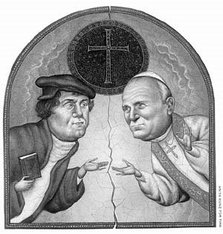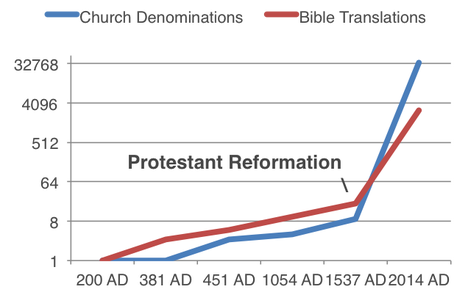
Protestant Christians assume getting a Bible into everyone’s hand is a good thing. Christian donors pump hundreds of millions into Bible translation and distribution every year. With that money Biblica, Wycliffe, and The Seed Company crank out translations in new languages. Scripture Union promotes Bible reading plans. Faith Comes By Hearing and YouVersion build out robust apps with audio Bibles. GoTandem even texts daily Bible verses selected for your season in life.
I wonder: Is all this cash and energy well spent? History says “no.”
Jesus had a dream. He envisioned a community of followers who embraced his way and each other. He prayed, “may they be one” (John 17:21). 34,000 church denominations later, his prayer goes unanswered.
Why? What fueled one man after another to split up the church? What made each group think they had the corner on truth and all others had erred? The answer is simple: The Bible.
The history of church division runs parallel to the proliferation of Bible translation. When leaders can individually interpret what the Bible really says, unity doesn’t stand a chance. Each interpreter mixes assumptions with "what the Bible says" to create a new version of the faith. The graph of church denominations and Bible translations (below) illustrates this dynamic. More Bibles, more languages, and more literacy equal more denominations.
For the first 1500 years of Christianity, major church denominations didn’t surpass single digits. The split between the Catholic Church (in the Western Roman Empire) and the Orthodox Church (in the East) was dubbed the “Great Schism” of 1054 AD. Why? Because major church splits were so rare. That all changed after the Protestant Reformation of the 16th century.
The Protestants hastened Bible translations into German, French, Spanish, English, etc. More Bibles in everyone’s home meant more individuals could determine what was biblical. So they started new denominations. The Protestant motto Sola Scriptura unwittingly excused any man’s opinions about the Bible from the checks and balances of trusted interpretive traditions and a community of gifted Christian leaders. Me, Jesus and the Bible devalued elders and community. Me, Jesus and the Bible created a divisive dynamic.
The Bible + my preferred meaning = 34,000 church divisions.
How have we let the Bible divide the church for 500 years?

Martin Luther is the Protestant superhero. He stuck it to “the man”—the big man in Rome. On October 31, 1517 he literally stuck his complaints about the Pope and priests on the Wittenberg church door. He called them out for selling salvation. He took away the church’s power to issue forgiveness via “pardon letters” and gave it back to God. And he didn’t stop there.
Luther wrote and taught boldly for the next 3 years. In the summer of 1519 he declared publicly, “The Bible does not give the Pope the exclusive right to interpret scripture.” Anybody can do it.
That claim did not go unnoticed. He was excommunicated from the church in 1520. In 1521, he was called before German authorities at the now famous “Diet of Worms” to face the consequences.
At the Diet of Worms, representatives of the Holy Roman Empire gave Luther one last chance to change his mind. Johann Eck, assistant to the Archbishop of Trier, laid out Luther’s controversial writings on a table. He asked Luther 2 simple questions: Are you the author and do you stand by their contents? Luther was prepared for the first question but not the second. He took credit for the writings but asked for a night to prepare an answer to the second question.
The next day Luther came prepared with his reply. His words would become legendary in Protestant circles. His words would embody the individualistic and existential route to determining truth that Protestants have promoted ever since. He said,
“I am bound by the Scriptures I have quoted and my conscience is captive to the Word of God. I cannot and will not recant anything, since it is neither safe nor right to go against conscience.”
“Martin, there is not one heresy which has torn apart the bosom of the church, which has not derived its origin from some interpretation of Scripture. The Bible itself is the arsenal from which every innovator has drawn his deceptive arguments.”
The irony of Luther’s rejection of papal decrees and church councils escaped him. He thought he had attributed sole authority to Scripture, yet the Bible itself was formed and finalized by church councils (check out The Fourth Council of Carthage in 419 AD). The very books to which he bound himself rested on decisions of the early Catholic Church.
Later in life Luther’s extreme confidence in his opinions over and against those councils and the Scriptures they trust would become clear. He denigrated the value of Matthew, Mark and Luke and recommended the removal of James, Revelation, and other Bible books that did not suit him. His inner persuasion became the authority for who God is and what we should all believe.
Luther’s unintended legacy has been Bible readers turning their opinions into new versions of the faith. The Bible + my preferred meaning = 34,000 church divisions.
Humanity is constantly threatened by the chaos recorded in Judges. “Everyone did what they felt was right” (Judges 21:25). A world full of independent and untrained Bible interpreters can biblically justify any personal opinion. A Bible in every language can lead just as much to the chaos of “create your own religion” as it does to the truth. Interpreting the Bible on your own does not only demonstrate trust in the Bible's authority; it betrays radical trust in one's self. We must interpret and act on the Bible's message with care.
Should we stop promoting personal Bible reading because it has dashed Jesus' dream of unity? Let me qualify my answer. If we don’t promote anything else to quell the confusion of “biblical” truths, then the answer is yes. Bible engagement is not inherently a good thing.
So what must we do to use the Bible correctly? My next post provides the first 3 steps to protect the church from unchecked individualistic Bible interpretation: Personal Bible Reading Destroys the Church (Part 2 of 2).







 RSS Feed
RSS Feed
